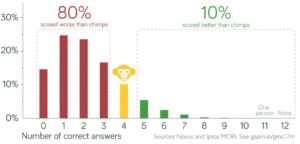“There is no room for facts when our minds are occupied by fear.” – Hans Rosling
The ongoing COVID-19 pandemic is the foremost subject on most people’s minds right now. Every day, we are bombarded with tonnes of information about the nature of the disease, how to protect ourselves, and what to expect going into the future. Even for infectious disease experts, let alone regular folk like you and me, it is hard to keep up with and make meaning out of all the data. Is it any wonder, then, that many people are panicking and feeling stressed about the situation?
Today’s blog post is the first of a two-part series in which I will draw on the work of a famous Swedish doctor to try and help you identify some of the ways you may be processing important information all wrong. I will also include a few helpful tips on how to think more clearly about all the facts being bandied around.
You vs Chimps
Before we begin, take a moment to answer the following question.
How many of the world’s 1-year-old children today have been vaccinated against some disease?
A: 80% B: 50% C: 20%
Come on, pick your answer. And no cheating! The correct answer is below the picture.

Fig 1: A child being vaccinated
According to the WHO and UNICEF, the proportion of children under 1 year vaccinated against Hepatitis B was 86% in 2016. In 2018, the latest year for which data is publicly available, it was 85%.
The correct answer, therefore, is 80%.
In a 2017 study, this and other similar questions were posed to a representative sample of 12,000 respondents from 14 countries. Of these, only a paltry 13% selected the correct answer.
When this same question was posed to chimpanzees, an impressive 33% of them answered correctly! Yeah, I know what you’re thinking … How could any chimp possibly know the right answer? More on that later.
Misconceptions
This question is from a set of fact-based questions used by the Gapminder Foundation to test for people’s knowledge and understanding of the world around them. If you haven’t heard of Gapminder before, it is a Swedish organization with the stated mission “to fight devastating ignorance with a fact-based worldview that everyone can understand”. It was founded in 2005 by the venerable physician, academic and sword swallower, the late Professor Hans Rosling.
The Gapminder test contains 13 questions similar to the one above. It is publicly available , and I encourage you to take it and see how you stack up against the chimps (you get a nice beautiful certificate if you pass).
When the number of correct answers per respondent was analyzed for 12 of the 13 questions in the survey, the results were astonishing. The chimps – who consistently answered 4 out of the 12 questions correctly – outperformed a whopping 80% of the humans! Even more shocking, 14% of the people managed to get all the questions wrong – a feat that no self-respecting monkey could possibly accomplish.

Fig 2: The results of the Gapminder misconceptions study (2017)
This study produced two interesting findings. First, people are not just uninformed about the world, they are hopelessly and systematically misinformed. This explains why they scored far worse than the chimps, which do not watch the news or read research papers. Secondly, the people of whom one would expect superior knowledge are just as misinformed as the rest of us. Specifically, neither subject matter experts nor journalists showed a better grasp of the facts relative to the general population.
This latter finding is especially alarming because it raises important questions about the degree to which we can trust the government and other leaders to make the right decisions about our welfare, given their reliance on experts with such a shaky grip on reality.
Overdramatic Instincts
Surprised by these results, the good folks at Gapminder set out to investigate why humans are so devastatingly misinformed, and what could be done to promote a more accurate and meaningful understanding of the world. They found that it wasn’t so much that people didn’t have access to the right facts. All experts and most ordinary people do. Instead, it was that we, as a species, have well honed instincts that favor the dramatic over the accurate – which leads to a highly skewed worldview.
Consider terrorism, for example. A single terrorist attack anywhere in the world is bound to be front page news across all the major news outlets, complete with chilling footage of mayhem and valiant rescue efforts. As a result, many of us who consume this news panic and conclude that we live in a perilous world where we could be taken out by the explosion of a suicide bomber’s vest at any moment.
The reality, however, is not half as frightening. In 2017, slightly over 26,000 people died as a result of terrorist activity. 26,000 is a lot of innocent lives, no doubt. It behooves governments and each one of us to do everything in our power to prevent this senseless loss of life. However, that number takes on a different meaning when you consider that a total of 56 million people died in the same year. In other words, terrorism accounted for a meager 0.05% of these deaths.
On the other hand, cardiovascular diseases caused close to 18 million deaths in 2017, or 31% of the total. That’s almost 700 times more deaths than terrorism! Yet, for most of us, the impetus to go out for a walk to manage our blood pressure is far weaker than the temptation to avoid the shopping mall in the hope of dodging a terrorist’s bullet.
Factfulness
In his 2018 book entitled Factfulness: Ten Reasons We’re Wrong About the World – And Why Things are Better than You Think , Hans Rosling identifies this particular bias (where we overestimate the risk associated with scary things such as terrorism) as the Fear Instinct. In total, he identifies 10 instincts that warp the way we process factual information, and by extension the conclusions we draw about the state of affairs in the world.
Having just recently read Factfulness myself, I think it is a timeless work of literature that will be relevant for many years to come. I think it is even more pertinent in the face of the current pandemic where we all find ourselves needing to make sense of a rapidly changing world amidst a sea of data and information. Thankfully, not only does Professor Rosling identify the biases that lead to our overdramatic worldview, he also offers useful tips for thinking beyond these biases and making more accurate and better reasoned deductions.
In the second part of this series, I will go over 5 of the 10 biases (or instincts, as they are referred to in the book) and how they may be clouding our understanding of the COVID-19 pandemic.
As always, if you enjoyed reading this post, please share it by clicking on any of the buttons below.
Read: Part 2: COVID 19, and Why Chimps Are Better Than You at Making Sense of the World
Good update insight to data analysis
A good read, and reminder of the need for conscious thought. How many people are even aware that fear is the force behind some of the clouded decisions we make?
Thanks for your comment, Benter. Glad you enjoyed reading.
You got me with the chimps bro. Keep up the good work always educating us.
Very good idea. I suggest COVID related questions too. Based on already known facts.
A great insight.will b keen to details
Chimps are better than us in making estimates of data – even with all the reading we purport to do? Indeed we are propelled by fear and biases. Clearly, we wear such lenses that that make us interpret the incoming information in light of the color of our shades. Time to evaluate my lenses. Nice read and looking forward to the next article.
Great article Nganga and a good reminder that the world is in fact getting better all the time. Also, I got 62% in the test so thankfully not as dumb as those chimps 😉
Hehe … well done on the test! You’re definitely an optimist. I am glad you enjoyed reading.